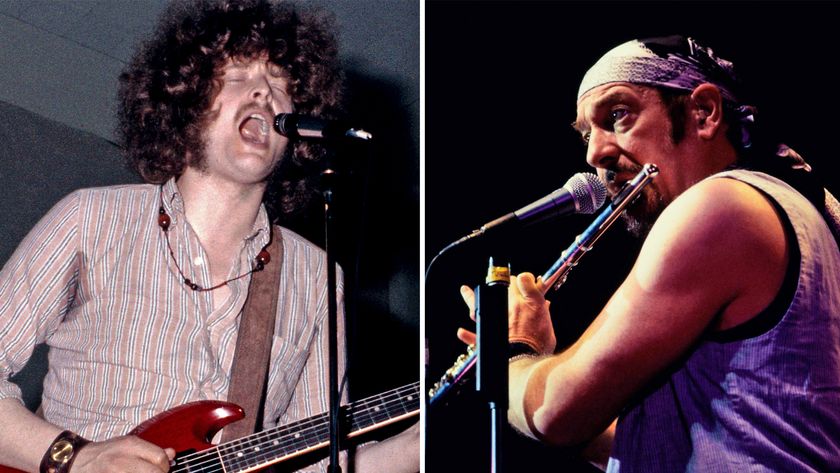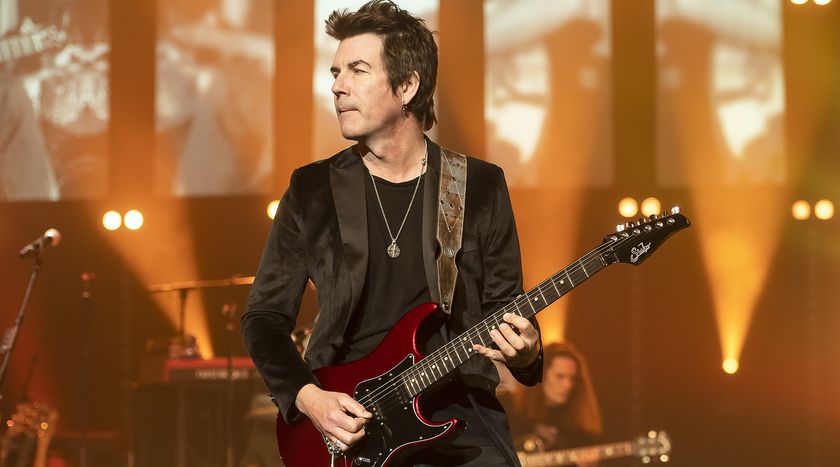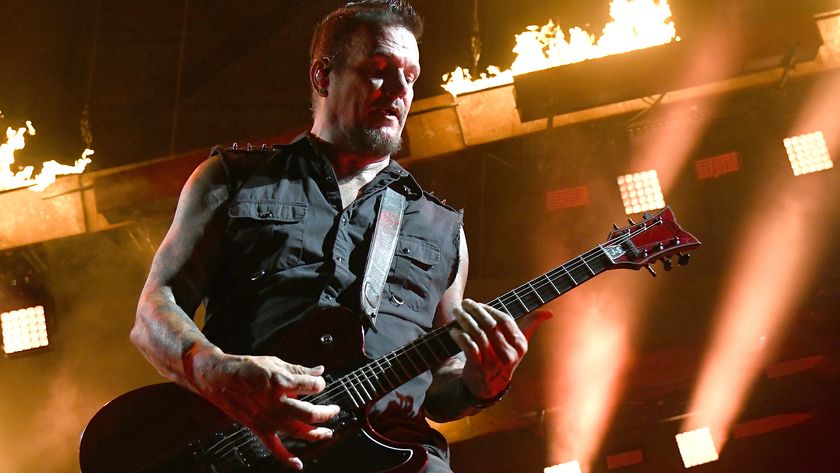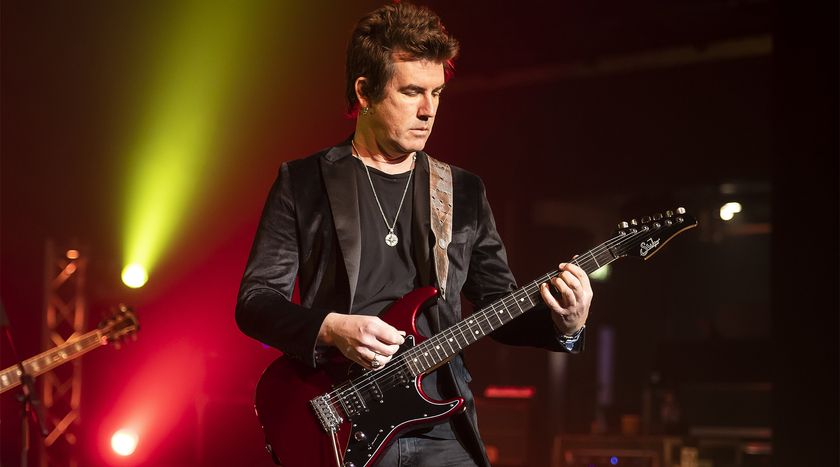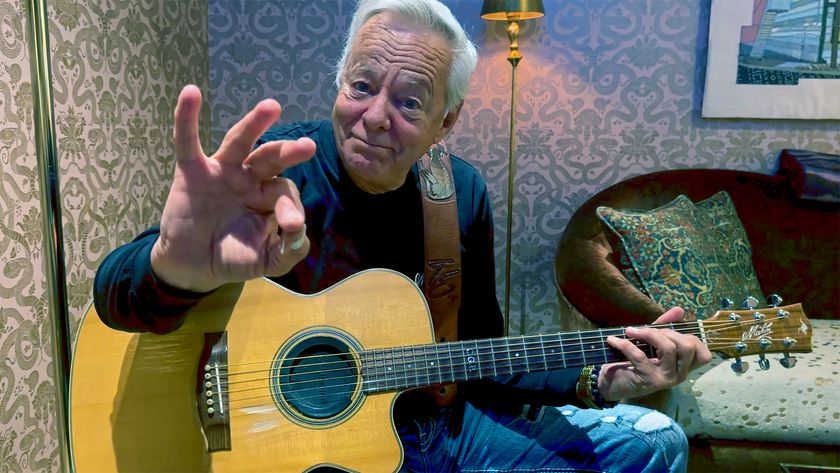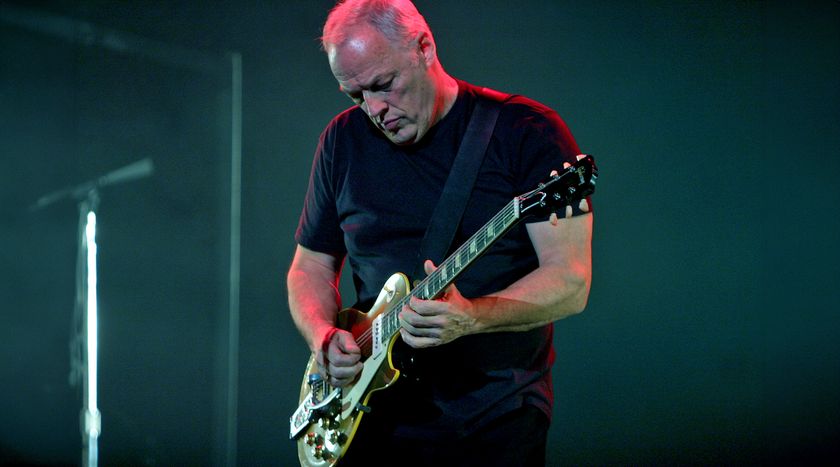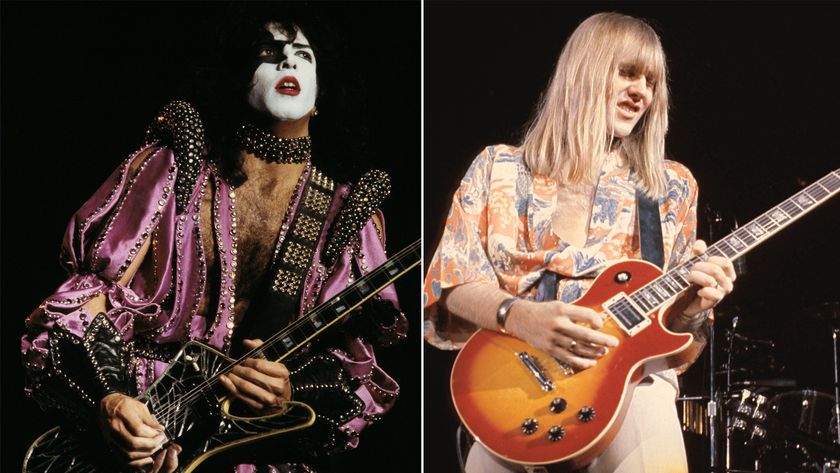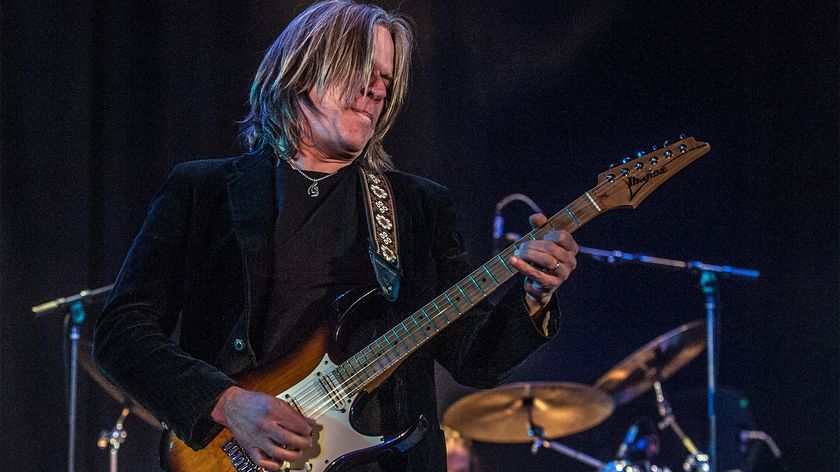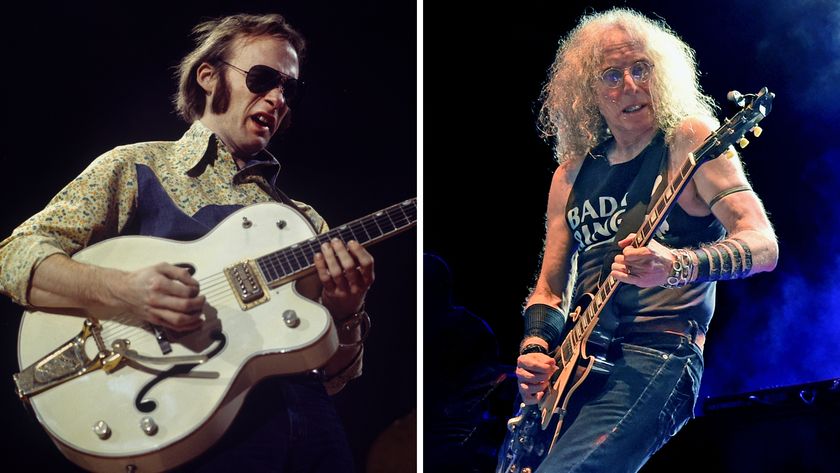“I had a ’60s Guild 12-string that was destroyed in Hurricane Sandy. Guild rebuilt the back for me... ever since, it sounds amazing”: How Rich Robinson used resurrected Guilds, and an unusual Fender amp, to make magic with the reunited Black Crowes
As the Black Crowes fly again with their first new album in 15 years, Rich Robinson reveals how music mended his relationship with his brother Chris, and kept the band true to their origins
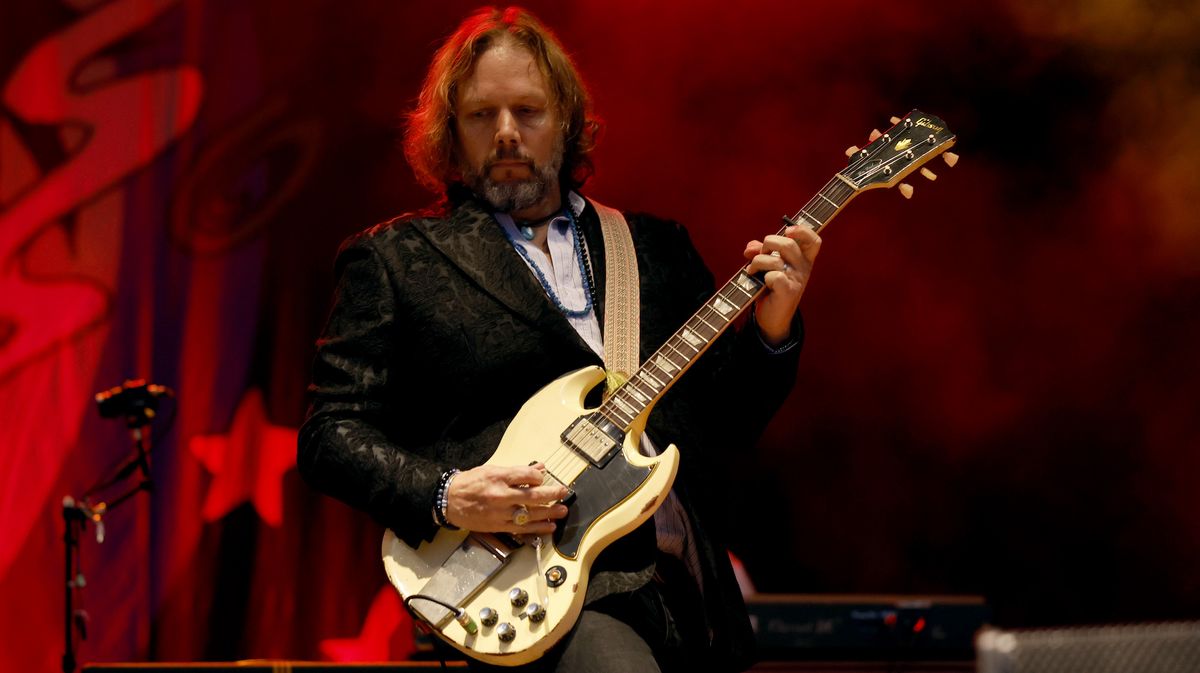
When Chris and Rich Robinson announced in 2019 that they were reuniting as the Black Crowes, it seemed that the endeavor might function strictly as a look back at the past.
In short order, the brothers – with Chris on vocals and Rich on guitar, and flanked by an entirely new group of musicians – announced a long tour to celebrate Shake Your Money Maker, the 1990 debut that catapulted the Georgia group to stardom roughly 30 years earlier on the strength of hits like Jealous Again, Twice As Hard, She Talks to Angels, and their cover of Otis Redding’s Hard to Handle.
“We thought the idea of playing the record that launched everything for us would be a cool thing to do, because we had never done anything like that,” Rich Robinson tells Guitar Player. “We decided to really home in on that album and those songs, and really celebrate Shake Your Money Maker.”
Except for a COVID-necessitated delay, that’s exactly what the Black Crowes did over the next few years, not only onstage but also with a 2021 30th anniversary multiformat reissue of the record. This was eventually joined by a Shake Your Money Maker live documentary, as well as an expanded reissue of the band’s 1992 sophomore effort, The Southern Harmony and Musical Companion.
Even when the Crowes released newly recorded music, it was in the form of a covers EP titled 1972, populated by versions of the Rolling Stones’ Rocks Off, David Bowie’s Moonage Daydream, and other classics hailing from the titular year.
That said, Robinson affirms that from the get-go, the intention behind
the Black Crowes reunion was “never to just go out and play old stuff,” he says. “We wanted to move forward.”
Now the Robinsons have done just that, with Happiness Bastards, their first album of new material under the Black Crowes name in 15 years. The 10-song collection presents the brothers in incredibly fine, fully re-energized form, and it’s a considerably harder-rocking affair than latter-day Crowes records like 2008’s Warpaint and 2009’s Before the Frost…Until the Freeze, which saw them incorporating elements of jam-band, folk, and Southern rock into their sound to a larger degree.
From racing slide guitars on the opener, Bedside Manners, to the AC/DC-ish throttle of Rats and Clowns, the Stones-y bluster of Bleed It Dry, and the gritty detuned riffing of Follow the Moon, Happiness Bastards is arguably the Crowes’ rowdiest effort since Shake Your Money Maker all those years ago. And while the album features its share of gentler moments – most notably the country-ish acoustic ballad, Wilted Rose, and the swelling, piano-tinged closer, Kindred Friend – Happiness Bastards is at its heart “a big rock and roll record, with a lot of rock and roll songs,” Robinson says.
We’ve always just made the records we want to make, and it’s the same thing with this record
As for where “a big rock and roll record” fits into the music landscape in 2024, Robinson doesn’t know or care. “I have no idea what’s popular,” he says, then laughs. “I mean, I know Taylor Swift’s popular, but I don’t listen to it. That’s not my bag. I don’t live in that sphere, and the Black Crowes have never lived in that sphere.”
Rather, Robinson continues, “we’ve always just made the records we want to make, and it’s the same thing with this record. Because we are who we are. I sound like me when I play, Chris sounds like him when he sings, and when we get together, it sounds like us. We’ve always done it just for the love of doing it. And that’s what we continue to do today.”

Since reuniting in 2019, the Black Crowes have been focused on playing older material, particularly in the full-album performances of Shake Your Money Maker. At what point did you decide to work on new songs?
“Well, Chris and I have always been writing songs, even during our time apart when we were doing our solo things. And then when COVID hit a few years ago, we basically had a year to sit down and work. So I wrote a bunch of songs and I would send ’em to Chris, and he would write lyrics and send ’em back to me, and we would kind of work it out that way. He had a neighbor that had a studio in his house, I had a studio in my house, and we just took advantage of that time.
“And the thing is, Chris and I have had our issues over the years, but throughout our history, whenever we would sit down and write or get into a studio, it always worked. That was the one time consistently that we never really went down those other paths.
“So getting to new music this time was just a natural progression. It was like, ‘Okay, let’s see what happens.’ Then when COVID lifted, we went on a world tour playing Shake Your Money Maker – Japan, Australia, South America, all over Europe, all over America – and it was a great thing. But nothing’s more exciting for us than writing new music and making a great record that we’re really proud of.”
Is there a particular song on Happiness Bastards where you knew, ‘Okay, we have something really special here’?
“There were a few. Cross Your Fingers was one that I always really liked when
I wrote it. And what Chris was singing I thought was amazing. Wanting and Waiting was another one of those songs.
“Bedside Manners was a newer one that came after COVID, where I went over to Chris’s house with this thing and we worked on it together, and it came out really great. Every record has songs that flow really well and really easily, and songs that maybe take a little time to flesh out. But those were three that flowed really easily this time.”
It’s been 15 years since you and Chris have recorded new music together. Was there anything this time that felt outside of what people might expect when they think of the Black Crowes?
“I think the chorus of Cross Your Fingers is a little different for us. It goes into a place that I wouldn’t have taken it, but when I heard it, I loved it. Like, ‘Oh, wow, that’s fucking cool.’ That’s where having our producer, Jay [Joyce], really came into play. What he did in that chorus was really cool and something that I wouldn’t have thought of.”
Flesh Wound is another one that really goes in a different direction for you guys. It has almost an early ’80s punk feel to it.
“That’s a good one. And you know, Chris and I actually come from a punk-rock background. Growing up in Atlanta in the ’80s, I think the first band I ever saw was this hardcore band, Corrosion of Conformity.
“I was maybe 15, and there was this place called the Metroplex in Atlanta. Our dad had a business down there, and one Sunday we went over to the Metroplex and we saw Corrosion of Conformity. And then we were into Black Flag, we were into X, the Ramones, the Clash... all these great bands. So when I wrote Flesh Wound, it was very punk rock, almost like an X thing, but obviously with Chris singing. It does feel maybe a little out of the box for us, but I really like it.”
I’ve always thought of songs as gifts. They’re magical. And I think what differentiated us from most of the other jam bands is that we have songs
You’ve referred to Happiness Bastards as a “big rock and roll record,” which it certainly is, more so than recent Black Crowes albums, which seemed to bring in more of a jam band influence.
“We lived in that place for a long time. And there was a push-and-pull with
me and Chris about that, starting with, maybe, [1994’s] Amorica, because Chris kind of dove into that world pretty heavily. So then, by the time we got to that later era in our career, we were firmly planted in that jam band kind of thing. But you know, most of those jam bands don’t have songs, and songs have always been the most important thing to me.
“I’ve always thought of songs as gifts. They’re magical. And I think what differentiated us from most of those other bands is that we have songs. This time, these were the songs that were coming out.”
What gear were you using in the studio?
“Well, I have my own amp company, Muswell, and I was using our Breaker amp that’s based on this ’68 [Marshall] Bluesbreaker that I have that’s amazing.
“I used the Muswell a lot, actually, and I also used the Bluesbreaker. Then I had a ’56 Fender Deluxe – I have two or three of ’em – and they’re amazing. And I bought this Fender white amp that’s like… I don’t even know how to describe it. It’s almost like a Princeton from the ’50s. Then there was a blackface Bassman that sounded huge, and one of my AC30s – all of these things that gave us different textures.”
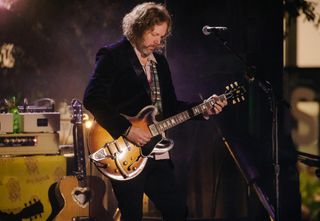
How about guitars?
“As far as guitars go, I bought a 1956 Les Paul Special, a TV yellow one, which is one of my favorite guitars I’ve ever had. It plays beautifully, it sounds amazing. I also bought a ’59 TV yellow Les Paul Junior that was in such good condition that when I got it, I kind of thought it was a joke. I opened the case and I was like, ‘This doesn’t seem right…’ [laughs] So, I played that a bunch, too.
“I also have a few [ES-]335s – a ’61, a ’62 and a ’68 – that I played a ton. I played my [Gretsch] White Falcon. I played my Fender Teles – a ’67 that sounds great and a black Custom Shop Tele that’s one of my favorite guitars.
“As far as acoustics, I have this Zemaitis prototype. It’s a jumbo, and it’s an amazing guitar. And I had my Martin signature model, the Appalachian, which is based on my dad’s [1954] D-28 that he gave me before he passed away. I used a few of those, and they sound unbelievable. Then I had a ’60s Guild 12-string that was destroyed when I lost a bunch of guitars in Hurricane Sandy [in 2012].
“Guild rebuilt the back for me, but the bracing and everything else stayed the same. And ever since they did it, the guitar sounds amazing. So I had that one in the studio, too.”
Did you use any effects?
“I did. There’s this guy who makes Ebo Customs amps. His name is Eric Borash, and he made a custom reverb unit for me that sounds like a plate reverb. It’s amazing. And then there’s another guy out in L.A. – his name is Gio, and he has a company called Black Volt Amplification, and he made me a really cool fuzz pedal. Then I had a couple of the Fulltone echo pedals, some Way Huge stuff, a couple of Strymon pedals... things like that.”
Who else performed on the new record alongside you and Chris?
“It was me, Chris and Sven [longtime Black Crowes bassist Sven Pipien]. [Current Black Crowes touring members] Brian [Griffin, drums], Erik [Deutsch, keyboards], and Nico [Bereciartua, guitar] played on the record, too.”
The Crowes have had so many great musicians in the band over the years. When you and Chris reunited, was there any consideration of bringing back some of the guys from the band’s earlier days?
“No, because we didn’t want to deal with all the negativity of the past. Chris and I felt that we could control our relationship more – and maybe understand each other better – if we didn’t have the people that were around us from back then that were trying to cause issues for petty reasons, or for power or whatever. We were like, ‘Let’s just have a clean slate and start over.’ We didn’t want to deal with the drama. We just wanted to make a great record, and we did.”
Is that possibly where the title Happiness Bastards comes from?
“[laughs] That’s a Chris thing. You’d have to ask him. But it could be. You never know.” [Happiness Bastard is the title of the only published novel by West Coast beat poet Kirby Doyle.]
We’ve always been an island to ourselves, and that’s the direction we’ve always followed. I would say that, with this record, that’s what we’re still doing
If you look back over the history and progression of the Black Crowes, all the ups, downs, and everything else you’ve experienced, do you feel you still create and play music with the same intention that you did when you were younger?
“I do. Because we always did it for the love of doing it. And look, commercially, we shot ourselves in the foot more than any other band [laughs], probably, because we felt that writing a song that moved us was more important than writing a song that someone in an office told us could be popular. So we always chose to make music that moved us, and in doing that we covered a lot of ground. To go from Shake Your Money Maker to The Southern Harmony and Musical Companion is a huge leap, musically.”
“Back then, we didn’t have a ton of life experience or experience as a band. I was 17 when I wrote She Talks to Angels. I was 19 when I recorded Shake Your Money Maker. I was in high school until a year before we made that record.
“Our shows, we would drive to Athens or Birmingham or Tuscaloosa on the weekends, and then we’d come back. To go from that to playing 350 shows in 18 months with the likes of Aerosmith, Robert Plant, ZZ Top, and AC/DC, going to Europe, going to Russia, traveling all over the world – you come back home with a huge amount of inspiration, a huge amount of ability. And we took that and continued to make the music we wanted to make.”
In the process you outlived a lot of trends and stylistic shifts in popular music, including the overall decline in the mainstream popularity of guitar-based rock and roll.
“We just never got bogged down by fear or the need to feel like we had to recreate something. We’ve always been an island to ourselves, and that’s the direction we’ve always followed. I would say that, with this record, that’s what we’re still doing.”
Tone clone: with Muswell Amplification, Rich Robinson remakes his beloved 1968 Marshall Bluesbreaker for any high roller who wants one
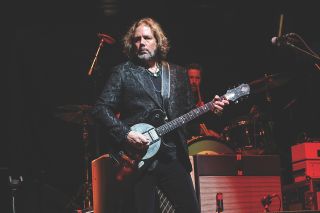
If you’ve listened to a Black Crowes record or ogled the stacks of vintage amps that sit stage left during the band’s shows, you’re aware that guitarist Rich Robinson is a tone and gear aficionado. Indeed, he tells Guitar Player, “Tone has always been incredibly important to me as a creative tool. What things sound like is just as significant as what you’re writing and what you’re saying.”
So, it makes sense that the songwriter and guitarist has now jumped even further into the tone game with his recently unveiled amplifier brand, Muswell Amplification. The inspiration behind the company, which Robinson founded with his guitar tech, Roland McKay, lay in his love for one of his beloved vintage amps: a 1968 Marshall Bluesbreaker.
“It’s a great amp,” Robinson says. “And the first thing a guitar player does when they get something great is want another one. Because sometimes when you’re dealing with vintage gear, you’re like, ‘Man, I really wish I had two of these, in case one breaks down.’”
But instead of attempting to find a second one, Robinson continues, “I said, ‘Can we just try to duplicate this?’ I had a guy who could do the exact same resistors, same everything, and we made it and it sounded great. Then I just thought, ‘Why can’t we make a couple for other people if they want one, too?’”
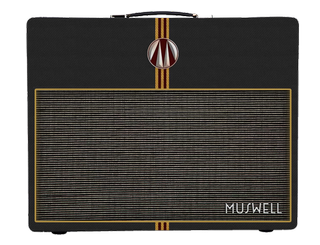
That led to the development of the flagship Muswell Breaker model, a 50-watt, all-tube combo loaded with two 12-inch U.K.-made Celestion speakers, enclosed in a premium birch cabinet, and offered in a variety of tweed coverings.
“It’s not meant to be mass-produced. It’s more of a custom thing,” Robinson says. “If someone wants one, they call us up or go over to the website and order it. It takes a little while to make, because it’s made by hand. And then we go from there.”
For Robinson, the goal with Muswell is to capture and reproduce great vintage tone and vibe without sacrificing anything in the process.
There’s a reason these old amps sound the way they do, a reason they sound amazing
“A lot of the bigger companies these days, it’s all about cutting corners and selling product,” he says. “And I’m like, ‘Why can’t you just do it right? Find the right tubes, find the right transistors, try different speakers and different woods... Really do the research.’ Sometimes that becomes a little more expensive, but these things matter to me.”
Robinson is currently using the Breaker onstage with the Black Crowes, and it can be heard on Happiness Bastards. Additionally, he reports that fresh designs are in the works.
“We have a couple ideas we’re working on,” Robinson says. “Because there’s a reason these old amps sound the way they do, a reason they sound amazing. So my thinking is, if you’re going to try to make a new amp, try to make it the best amp it can be.”
As for where he came up with the company name? That has vintage origins as well. “It’s a nod to the Kinks’ Muswell Hillbillies album,” Robinson says with a laugh. “I just really love that record.”
- The Black Crowes' Happiness Bastards is available to purchase or stream now.
Get The Pick Newsletter
All the latest guitar news, interviews, lessons, reviews, deals and more, direct to your inbox!
Rich is the co-author of the best-selling Nöthin' But a Good Time: The Uncensored History of the '80s Hard Rock Explosion. He is also a recording and performing musician, and a former editor of Guitar World magazine and executive editor of Guitar Aficionado magazine. He has authored several additional books, among them Kurt Cobain: Montage of Heck, the companion to the documentary of the same name.

"Shredding is like talking a foreign language at 10 times the speed of sound. You can't remember anything." Don Felder reveals the unlikely influence behind his iconic guitar solo for the Eagles' “One of These Nights”

"Old-school guitar players can play beautiful solos. But sometimes they’re not so innovative with the actual sound.” Steven Wilson redefines the modern guitar solo on 'The Overview' by putting tone first




